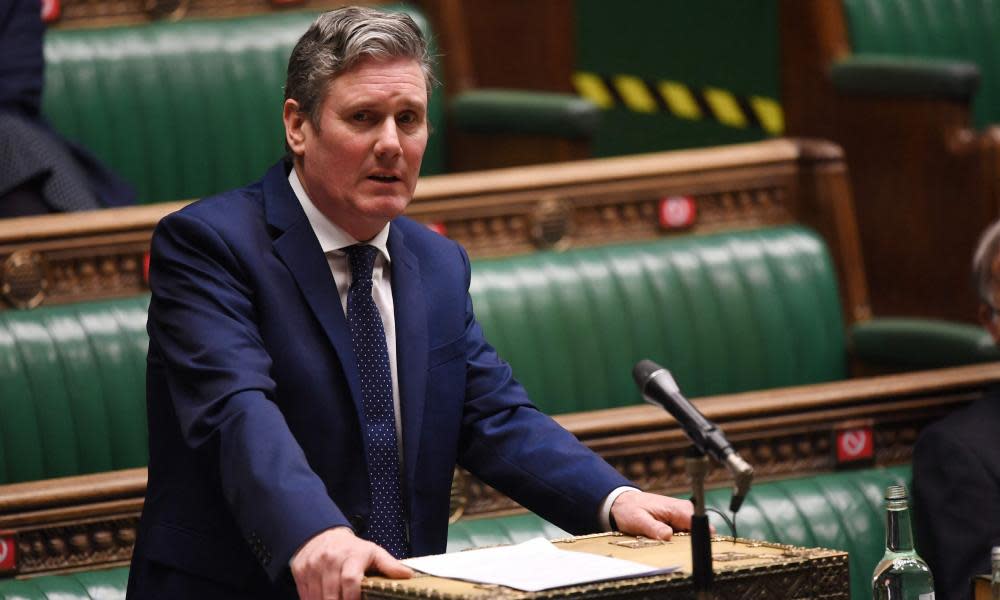Keir Starmer unites his Labour critics with 'no tax rises' stance

When Keir Starmer chose to make taxation one of the dividing lines with the Tories at prime minister’s questions on Wednesday, he was returning to a familiar recent theme.
Keen to underline their pro-business credentials, he and the shadow chancellor, Anneliese Dodds, have both been making the point for weeks that this is not the time to raise taxes, including on companies.
But with reports suggesting the chancellor, Rishi Sunak, may announce increases in corporation tax and capital gains tax at next week’s budget, the possibility opened up of a Tory chancellor proposing to tax big business to pay for the crisis – and Labour opposing it.
Related: Keir Starmer under pressure to back plans for corporation tax rise
That united Starmer’s two groups of internal critics: those who worry that he is too centrist, and those who broadly back his politics but would like him to be bolder in setting out his stall.
Starmer wants to make tackling social and economic inequalities a central theme of his leadership, as he set out in a speech last week. A more progressive tax system will inevitably have to be part of that, and it is highly likely to involve increasing the UK’s internationally low corporation tax rates, a policy that Labour supported both in 2015 and 2019.
During his leadership campaign, as fellow Labour MPs were quick to point out, Starmer said he would “reverse the Tories’ cuts in corporation tax”. But for now, Starmer’s team are wary of being saddled with the old caricature of Labour being the party of tax and spend, spend, spend – and keen not to say too much about policy at all, so far away from a general election.
And Starmer’s team believe that economically, now is the wrong time to increase taxes. Just as George Osborne’s spending cuts clobbered demand following the global financial crisis, the argument goes, mid-pandemic is not the time to weigh down struggling businesses and consumers with higher tax bills.
They’re not alone in that. The global consensus on tax-and-spend has changed radically in the decade since Osborne accused Labour of failing to “fix the roof while the sun was shining”. Across developed economies, there is an acceptance that the height of a pandemic is not the time to “pull the rug out”, as the prime minister phrased it earlier this week.
But the party’s coyness about future policy meant Wednesday’s argument against tax increases was easily read – including by some irritated Labour frontbenchers – as a repudiation of the plan to increase corporation tax. Some shadow cabinet sources complained that the policy had been set out before it had been fully worked through.
Labour leftwingers with long memories feared the influence of Peter Mandelson, who helped repair Labour’s relationship with business in the early 1990s, and whom Starmer’s team concede they have been talking to.
It may also have opened the door for an opportunist No 10 to say it is prepared to force businesses that have done well out of the crisis to chip in, while Labour is not. Corporation tax is paid only on profits, so the firms hardest hit by the crisis would be unlikely to be affected.
The shadow foreign secretary, Lisa Nandy, was sent out to flesh out Labour’s position on BBC Two’s Politics Live on Thursday.
She said that for some businesses an increased corporation tax bill could be the difference between survival and going under, but also conceded that Labour was not against future hikes in corporation tax. “There will be a time for raising taxes, doing it fairly, and paying down the debt – but that time is not now,” she said.
That carefully calibrated position – increase business taxes, but not now – appeared to have smoothed over the worst of the ructions over Labour’s approach. But if Sunak does opt for a package of immediate tax increases on businesses, selling it as the few winners from the past grim year paying their fair share for the costs of the pandemic, Starmer could come under internal pressure to back it.

 Yahoo News
Yahoo News 
